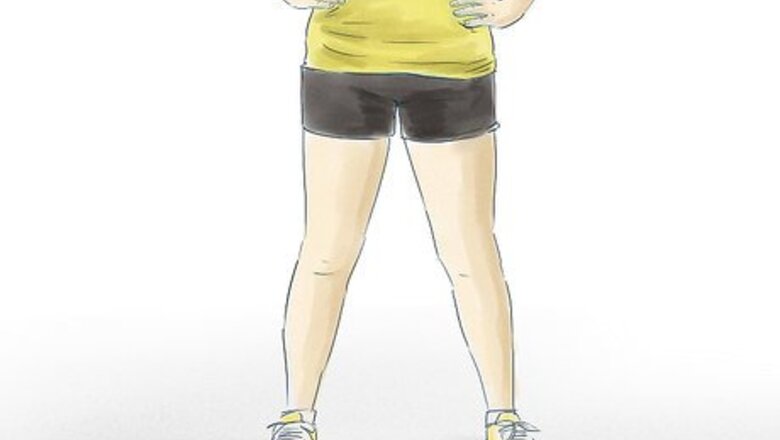
views
Working out with Intensity
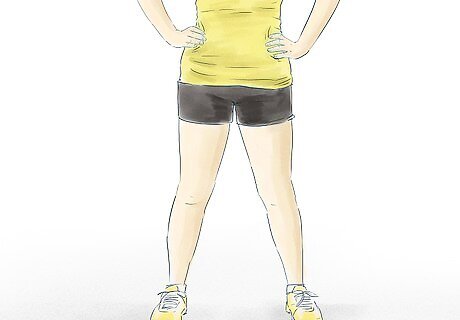
Push yourself to work out harder. Muscle growth happens when you exert your muscles so that the tiny fibers get broken down, giving them the chance to come back bigger and stronger. When you do exercises your muscles are already used to handling, this process doesn’t happen. Only when you push yourself to go all in – exercising until you feel that burn – do your muscles respond by getting bigger. You can start seeing improved growth right away by taking a more intense approach to your workouts. Make sure you’re using enough weight to actually challenge your muscles. If you’re a beginner, you might do thigh-building exercises without any weights. If you find these to be easy, use dumbbells or a barbell loaded with enough weight that you have to stop after about 10 reps. It’s important to recognize the difference between pushing yourself to the limit and pushing yourself to injury. If you are a beginner when it comes to strength training, it’s a good idea to work with a trainer to learn more about your personal limits.
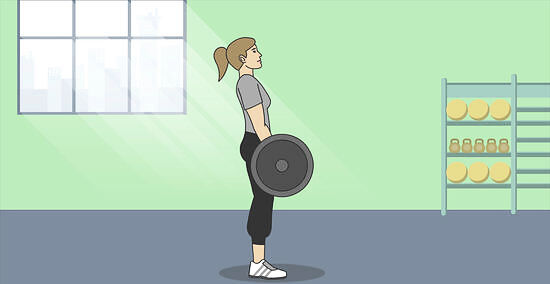
Do explosive exercises. Exercising “explosively” – using fast bursts of motion instead of slow, steady motions – has been shown to increase muscle growth. Keep this in mind when you’re completing your thigh exercises. Tip: Try incorporating a lot of jumping exercises, sumo squats, and skater lunges into your workout to get those explosive muscle fibers involved.
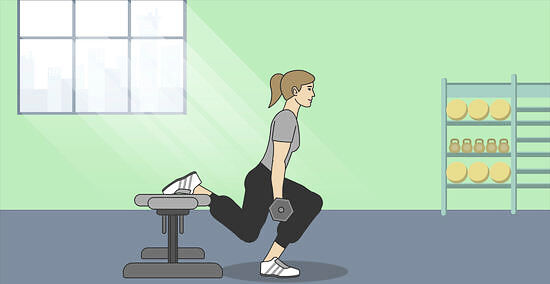
Make sure you’re using the right form. Any given exercise isn’t going to lead to the results you want if you’re not doing it the right way. Work with a certified personal trainer to determine the right way to do thigh exercises. When you exercise, keep in mind that you should feel the burn primarily in your thighs. If you’re feeling it elsewhere, your form is probably slightly off. Using the right form is also an important way to stay safe while exercising. If you do an exercise wrong over and over you could injure your muscles or joints. You also want to make sure you aren’t using so much weight that it’s affecting your form. If your dumbbells are so heavy that you can’t fully complete an exercise, you need to be using less weight.
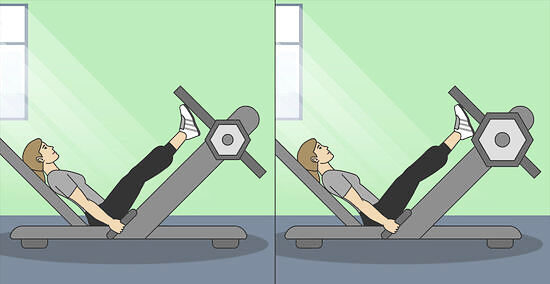
Add weight and reps over time. As the weeks go by, your muscles will grow and soon become accustomed to the amount of weight you’re bearing. In order to make them continue to get bigger, you’ll need to increase the weight every few weeks. Do 10 reps with a few different weights. Stick with the weight that allows you to do all 10 reps without stopping, but makes you struggle some to complete the last one.
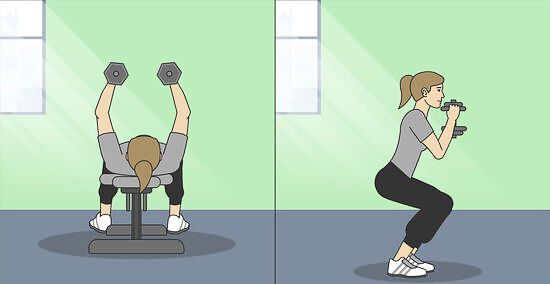
Work out different muscle groups on different days. This gives your muscles a chance to rest and rebuild while you’re working out another group of muscles. If you focus on thigh exercises one day, work out your back, chest and arms the next day, then go back to thighs. The recovery period is just as important to muscle growth as the breaking down period.
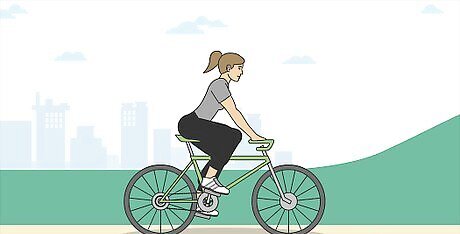
Modify your cardio sessions. Mountain biking, hill cycling, uphill hiking, and sports that involve jumping, kicking or explosive running are all great for thigh muscle development. Avoid jogging for more than 3-4 hours per week because too much long distance running may burn down muscle bulk in the thighs.Tip: If you suspect that cardio is preventing bulky muscle growth, don’t spend more than 20 minutes on cardio exercises three times a week. If making this change doesn’t make a difference, return to more frequent cardio to keep your heart and lungs strong.
Building Thick Thighs With Classic Exercises
Do squats. This is the quintessential thigh-building exercise, since it works out your hamstrings in the back and your quadriceps in the front. If it's not already part of your regimen, change that right now. You can do squats without weights or make them more challenging by holding dumbbells or a barbell. When you squat, make sure your knees stay aligned above your ankles and never extend out past your toes. Stand upright with your feet slightly wider than shoulder width apart. Have your toes pointing forward. Do not lock your knees. If you're using weights, hold them with both hands in front of you at rib level. Place your weight from your stance in your heels, not the balls of your feet. Bend your knees and push your bottom back and down, as if you were sitting in a chair, until your thighs are parallel to the floor. Then slowly rise back up into standing form. Repeat this process 6-10 times in a row, take a break, and do it again, 2-4 more times. Do this exercise 2-3 times a week to build thicker, stronger thighs. EXPERT TIP Laila Ajani Laila Ajani Fitness Trainer Laila Ajani is a Fitness Trainer and founder of Push Personal Fitness, a personal training organization based in the San Francisco Bay Area. With over 10 years as a trainer and exercise specialist, Laila has expertise in competitive athletics (gymnastics, powerlifting, and tennis), personal training, distance running, and Olympic lifting. Laila is certified by the National Strength & Conditioning Association (NSCA), USA Powerlifting (USAPL), and she is a Corrective Exercise Specialist (CES). Laila Ajani Laila Ajani Fitness Trainer Try these variations: Any variation of squats will work out your thighs and get them stronger. For instance, try a back squat, where you put a barbell on your back, then do squats. You can also do front squats, where you put the barbell in front. Other variations include lunges, step-ups, pistols squats, leg presses, and Bulgarian split squats.
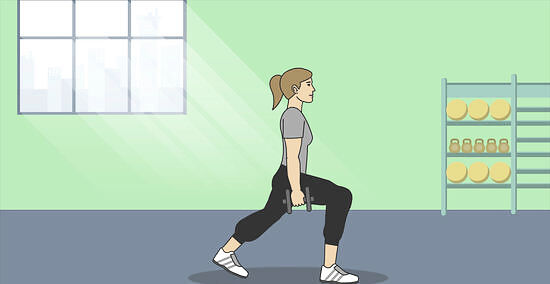
Do lunges. This is another classic thigh exercise that can be done with two dumbbells to up the ante. Lunges help your calves get bigger, too. Use this form when doing lunges: Stand with your weights at your sides. Take a big step forward with one foot. While you're stepping, bend the knee of the other leg so that it almost touches the ground. Rise back to starting position, then repeat the exercise by stepping with the other foot first. Repeat this process 6-10 times in a row, take a break, and do it again, 2-4 more times. Do this exercise 2-3 times a week to build thicker, stronger thighs.
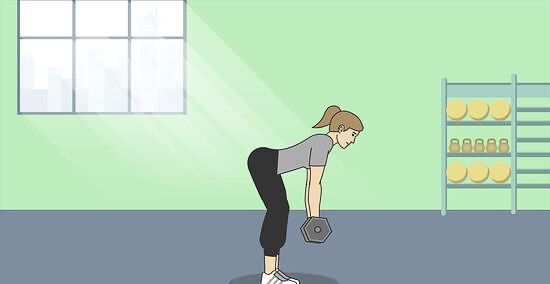
Do stiff-legged deadlifts. This exercise works out your hamstrings. To do it, you'll need two dumbbells, a weighted ball, or a barbell loaded with the amount of weight you can lift 10 times before needing to stop. Stand with your feet shoulder-width apart. The weight equipment you're using should be sitting in front of you. Hinge forward from the hips, keeping your abs tight and your back straight. Bend your knees enough to reach the weights, then straighten your legs so that you only have a slight bend in your knees. Straighten your back and lift the weights at the same time. Bend again to place the weights back on the floor. Repeat 10 times, then rest and do two more sets.
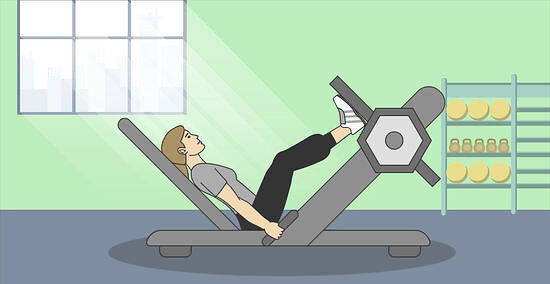
Do leg presses. You'll need a machine to do this exercise, but the results may be worth joining a gym for. Leg press machines allow you to adjust the amount of weight you use, so you can increase it as your thigh muscles get stronger. Sit back on the leg press machine and place your feet against the footpads. Your knees should be bent. You can grip the hand grips for stability. Push the footpads with your feet. Pushing on the machine causes the weights to lift. You should be able to feel it in your thighs. Lower the weights back to the starting position by bending your knees. Repeat 6-10 times, then rest and do 2-4 more sets.
Eating Well for Muscle Growth
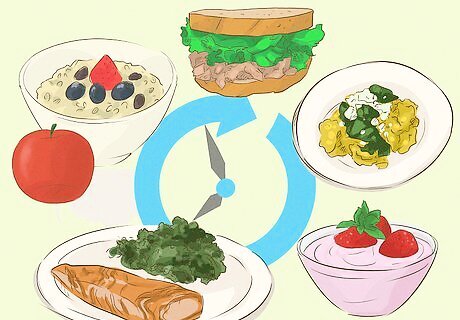
Eat foods that help muscle grow. Building muscle takes the right kind of fuel. You may need to eat more than your standard three meals a day in order to see results. Consider whether you want to gain weight or just redistribute your current weight. Gaining requires consuming more calories. Some bodybuilders suggest eating 5 meals a day, with each meal including bigger portions than normal. It may not feel comfortable, but if you want bigger muscles, they need to be fed. Eat before and after workouts. This will ensure your muscles are never low on fuel.Note: Eat healthy carbohydrates before working out. Quinoa, brown rice, and whole grains are good sources of carbohydrates.
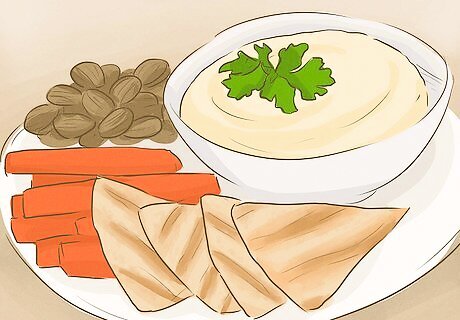
Get your calories from healthy whole foods. Eating more doesn’t mean eating unhealthy food. Get your calories from healthy, whole, natural foods that aren’t loaded with salt, sugar and preservatives. Try to eat home cooking as often as possible. Don’t rely on protein bars and power drinks to get your fuel. Eating real food is a lot healthier for your muscles. Stay away from fast food, salty snack foods, and desserts – these will only leave you feeling fatigued, and it’ll be harder to get your workouts in.
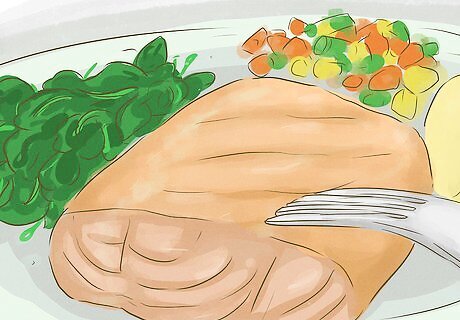
Make sure every meal includes protein. Protein is the building block of muscles, and it should be at the center of all of your meals when you’re concentrating on muscle growth. In addition to whole grains, legumes, and lots of fruits and vegetables, eat meat, fish, eggs, and dairy to get your daily protein. Try to buy meat that is farm-raised and hormone free. If you’re loading up on meat, you don’t want to be loading up on hormones and chemicals at the same time. If you prefer not to eat meat, try tofu, beans, and leafy greens that contain protein such as spinach and kale.
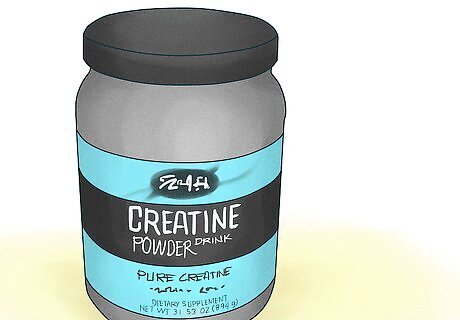
Consider taking supplements to aid muscle growth. You want to use supplements carefully, since many haven’t been proven to help spur muscle growth. Expensive protein powders probably aren’t worth the money. Do research to find out which supplements might be right for you. Creatine is a muscle-building supplement that is considered safe when you take the recommended dosage. It’s important that you don’t rely on supplements to get bigger thighs if you aren’t putting in the work to exercise and eat right. Supplements can help you stay on track, but there are no miracle pills that will make your legs get bigger.
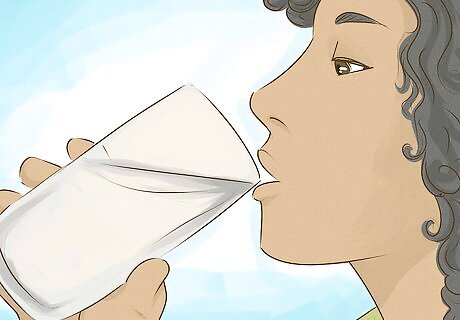
Stay hydrated throughout the day by drinking at least 8 to 10 glasses of water. This will help your body process protein and keep you healthy and active. Drinking plenty of water also gives you the energy to build thick muscles easier.













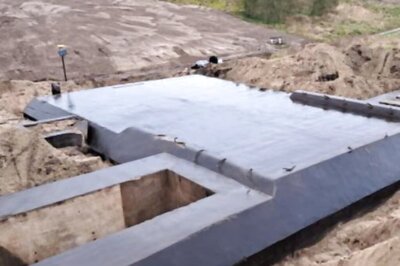






Comments
0 comment